The phrase La Hawla Wala Quwwata Illa Billah ( لَا حَوْلَ وَلَا قُوَّةَ إِلَّا بِالله ), also known as ‘ḥawqalah,’ is a simple yet powerful statement. It’s a way to declare Allah’s oneness, power, and grace while expressing our respect and need for Him.
Our beloved Prophet (Peace Be Upon Him) stated:
“Shall I not teach you a statement which lies beneath the Throne and is from the treasures of Paradise? Say لَا حَوْلَ وَلَا قُوَّةَ إِلَّا بِالله upon which Allah says: ‘My slave has submitted and surrendered himself.’” (Hākim)
The reason ‘ḥawqalah‘ is called a treasure is because its reward is kept safe for the person who says it, to be given in the hereafter, much like treasures are kept safe in this world.
La Hawla Wala Quwwata Illa Billah Meaning
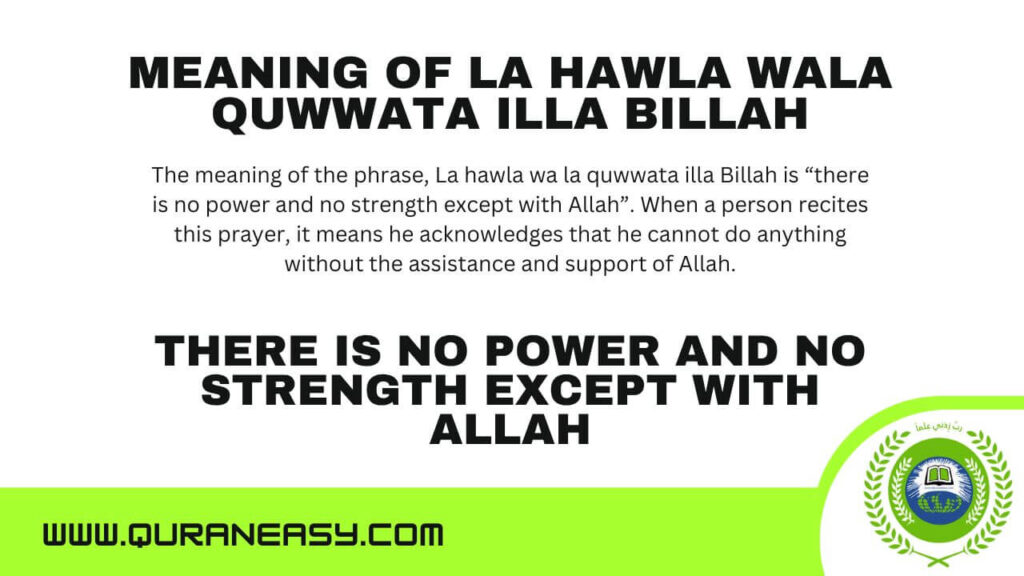
The meaning of the phrase, La hawla wa la quwwata illa Billah is “there is no power and no strength except with Allah”. When a person recites this prayer, it means he acknowledges that he cannot do anything without the assistance and support of Allah.
How To Write La Hawla Wala Quwwata Illa Billah In Arabic?
The phrase “La Hawla Wala Quwwata Illa Billah” is written in Arabic as follows:
لاَ حَوْلَ وَلاَ قُوَّةَ اِلَّا بِاللّٰهِ
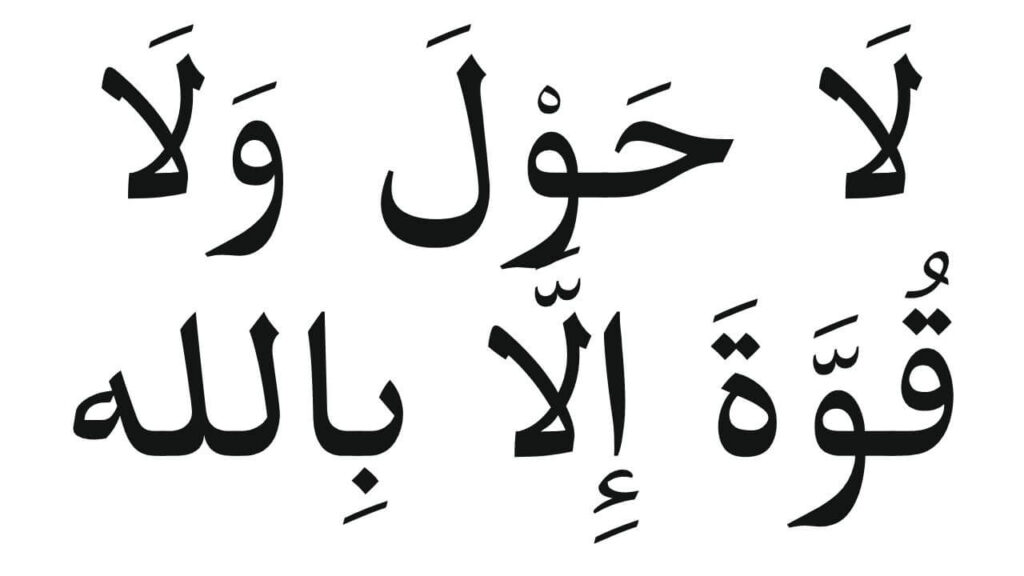
La Hawla Wala Quwwata Illa Billah Longer Version
La Hawla Wala Quwwata Illa Billah is indeed a shorter form of La Hawla Wala Quwwata Illa Billahil Aliyyil Azeem. The longer version carries the same core message but with a deeper emphasis on the majestic and supreme power of Allah.
La Hawla Wala Quwwata Illa Billahil Aliyyil Azeem means “There is no power nor strength except by Allah, the High, the Great.” This extension, “Aliyyil Azeem” which means the High, the Great, further elaborates Allah’s high authority and sublime status.
Both versions, “La hawla wala quwwata illa billah” and “La hawla wala quwwata illa billahil-aliyyil-azim” are correct. The extended version includes extra praises of Allah, highlighting His grandeur. While both are acceptable, many prefer the longer version for its additional supplications.
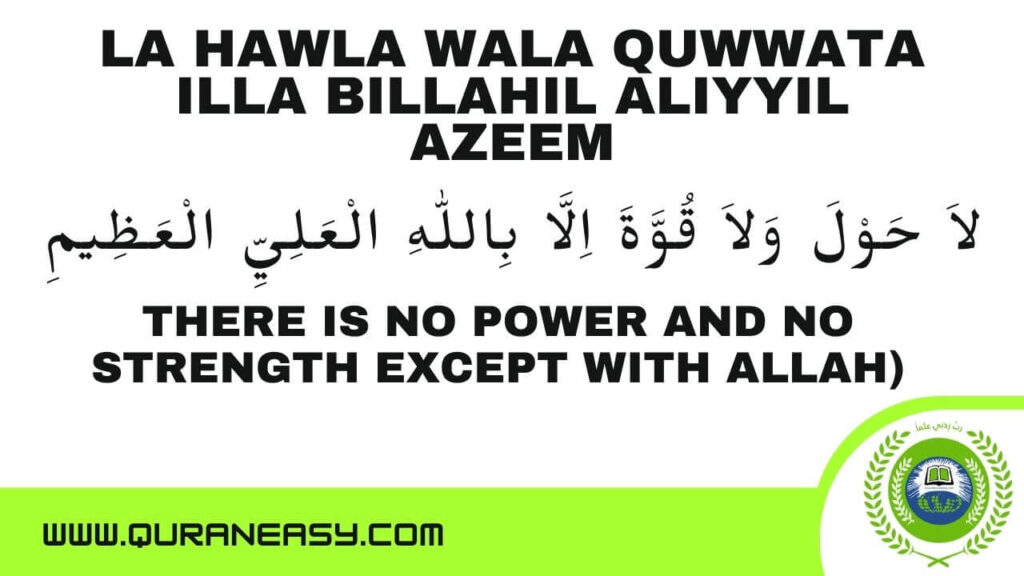
La Hawla Wala Quwwata Illa Billah Pronunciation
The pronunciation of this supplication resonates with the heart’s beat of every believer. It goes like: La Haw-la Wa-la Quw-wa-ta ll-la Bil-lah-hil Ali-y-yil Azeem.
When to Recite La Hawla Wala Quwwata Illa Billah?
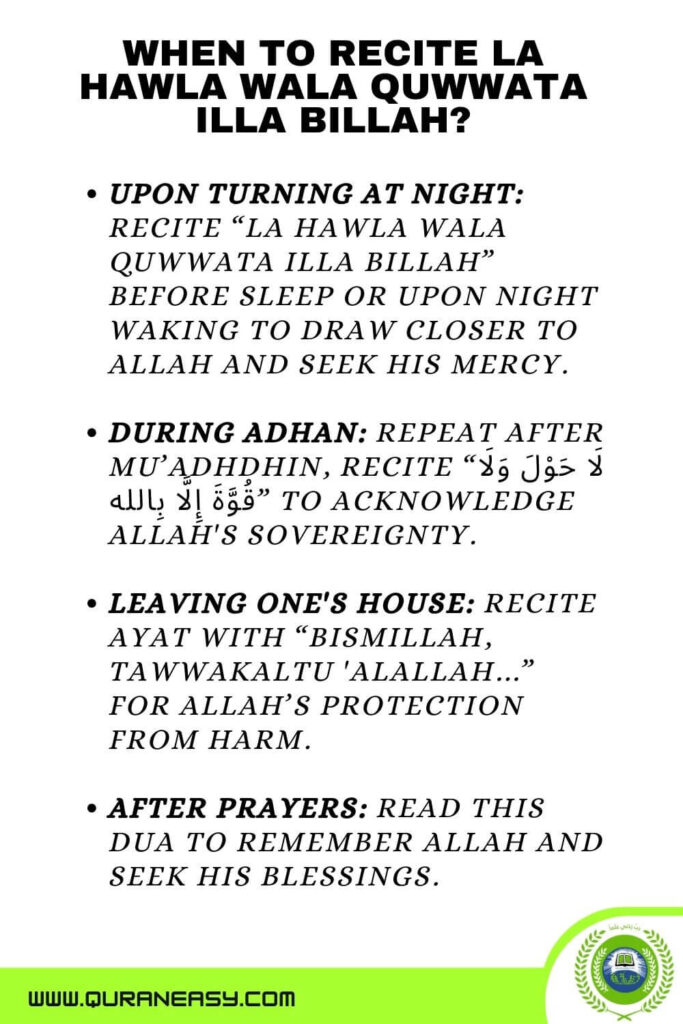
Anyone, at any time, can recite this prayer to request Allah’s guidance and strength, especially during challenging times. It’s a way to remember that true strength lies in submitting to Allah’s will.
Upon Turning at Night
Reciting this dua along with other supplications before sleeping or when waking up at night is a practice backed by Hadiths, which draws a believer closer to Allah and asks for His mercy.
During Adhan (Call to Prayer)
As the Mu’adhdhin calls for prayer, it’s a sunnah to repeat after him and recite “La hawla wa la quwwata illa Billah” during certain sayings of the Adhan, acknowledging Allah’s sovereignty.
It was narrated that ‘Alqamah bin Waqqas said:
“I was with Mu’awiyah when the Mu’adhdhin called the Adhan. Muawiyah said what the Mu’adhdhin said, but when he said: ‘Hayya ‘alas-salah (come to prayer),’ he said: ‘La hawla wa la quwwata illa Billah (There is no power and no strength except with Allah);’ and when he said: ‘Hayya ‘alal-falah (come to prosperity),’ he said: ‘La hawla wa la quwwata illa Billah (There is no power and no strength except with Allah).’ After that he said what the Mu’adhdhin said, then he said: ‘I heard the Messenger of Allah (ﷺ) saying exactly like that.’”
Leaving One’s House
When stepping out of one’s home, reciting this ayat along with “Bismillah, tawwakaltu ‘alallah…” is a means of request for Allah’s protection from any harm.
Anas (May Allah be pleased with him) reported:
Our Prophet Muhammad (ﷺ) said,
“Whoever says (upon leaving his house): ‘Bismillah, tawakkaltu ‘alallah, wa la hawla wa la quwwata illa billah [I begin with the Name of Allah; I trust in Allah; there is no altering of conditions but by the Power of Allah],’ it will be said to him: ‘You are guided, defended and protected.’ The devil will go far away from him”. [Abu Dawud, At-Tirmidhi and An- Nasa’i]. Abu Dawud reported it with this addition: “One devil will say to another: ‘How can you deal with a man who has been guided, defended and protected?”
After Prayers
Reciting this phrase post prayers is a means to stay in remembrance of Allah and gain His blessings.
La Hawla Wala Quwwata Illa Billah In Hadith And Quran
Several Hadiths signifies the importance of this dua, indicating its status as a treasure from Paradise and its power to seek Allah’s help in changing circumstances. Here’s one of them:
It was narrated that Abu Musa said: “The Prophet (saas) heard me saying: ‘La hawla wa la quwwata illa billah (there is no power and no strength except with Allah).’ He said: ‘O ‘Abdullah bin Qais! Shall I not tell you of a word which is one of the treasures of Paradise?’ I said: ‘Yes, O Messenger of Allah.’ He said: ‘Say: La hawla wa la quwwata illa billah (There is no power and no strength except with Allah).’”
ALLAH SWT mentions in Quran:
وَلَوۡلَآ إِذۡ دَخَلۡتَ جَنَّتَكَ قُلۡتَ مَا شَآءَ ٱللَّهُ لَا قُوَّةَ إِلَّا بِٱللَّهِۚ إِن تَرَنِ أَنَا۠ أَقَلَّ مِنكَ مَالًا وَوَلَدًا
Meaning in English
Why, when you entered your garden, did you not say, (Everything is) as Allah wills. There is no power except with Allah? If you see me inferior to you in wealth and children.
This verse is taken from Surah Kahf (18:39), which narrates a lesson in humility and reliance on Allah’s power alone, driving the message that all power and change are in the domain of Allah.
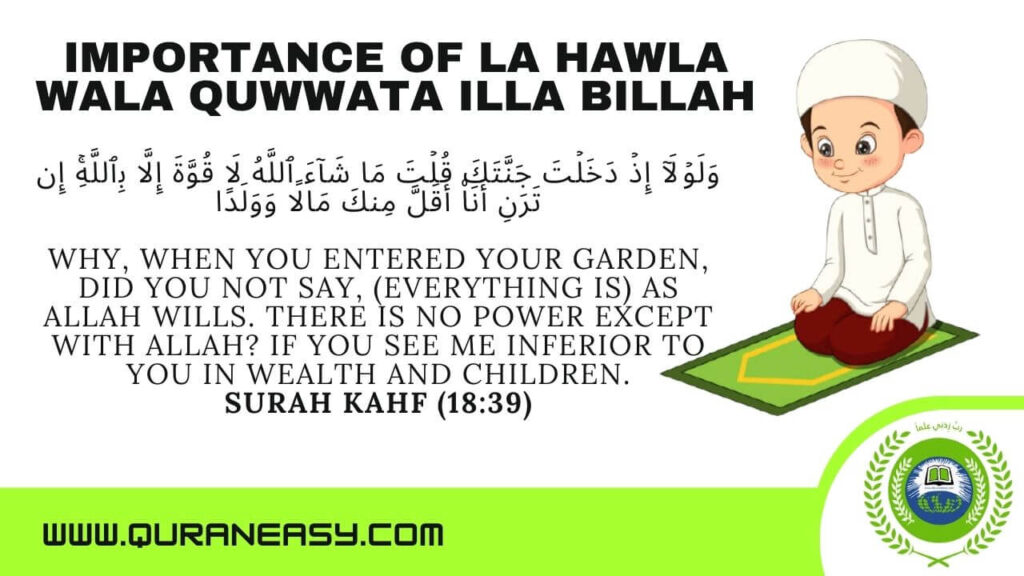
The Significance of La Hawla Wala Quwwata Illa Billah
The respected Imam al-Ghazali, known as the Proof of Islam, said:
“Power (hawl) refers to action, and ability (quwwa) refers to capability.”
No being has the capability or power to do anything except through Allah, who is All-Able and All-Capable.
The supplication La Hawla Wala Quwwata Illa Billah reminds us that all ability and power come from Allah alone. It’s like saying, we can’t do anything unless Allah helps us.
By saying this dua, we admit that we need Allah’s help in everything we do, which brings us closer to Him and helps us remember to ask for His help in our lives.
Benefits Of La Hawla Wala Quwwata Illa Billah
Treasure of Paradise
La Hawla Wala Quwwata Illa Billah is often described as a treasure from Paradise because it holds immense value in the eyes of Allah.
By reciting it, believers are reminded of Allah’s supreme power, which in turn draws Allah’s mercy and blessings upon them. It’s like a precious jewel from Paradise that believers can carry in their hearts.
Protection from Shaytaan
When believers recite this ayat, it acts like a shield against the harmful whispers and tricks of Shaytaan. It’s a way to achieve Allah’s protection, keeping evil thoughts and actions at bay.
Just like a cloak protects from cold, this phrase protects believers from Shaytaan’s misguidance, keeping their faith warm and strong.
Forgiveness of Sins
Reciting this prayer with a humble heart is a way of begging Allah’s forgiveness. It’s an admission of our own weakness and a plea for Allah’s mercy.
When believers acknowledge that all power and strength come only from Allah, it opens the doors of forgiveness, paving the way for spiritual cleansing and Allah’s mercy.
Secret Behind La Hawla Wala Quwwata Illa Billah
The essence of لَا حَوْلَ وَلَا قُوَّةَ إِلَّا بِالله is to recognize our own limitations and the ultimate power of Allah. It teaches that without Allah’s will, we cannot change anything in our lives.
When faced with difficulties, reciting this saying assists muslims desiring Allah’s support and reminds them that with Allah’s support, anything is possible.
The Recitation Of La Hawla Wala Quwwata Illa Billah During Different Situations Of Life
Facing Overwhelming Situations
Reciting “Laa hawla walaa quwwata illaa billaah” during challenging times is like having a gentle reminder that Allah is with us. It encourages a sense of hope and resilience. For instance, someone facing a tough financial situation might find a sense of solace and hope.
Similarly, someone dealing with a family crisis can recite this ayat to get Allah’s guidance and support, believing that with Allah’s help, solutions and ease will come.
Seeking Improvement or Strength
Reading this dua when wishing a positive change is key to knocking on Allah’s door, asking for His blessings for improvement. When a person recovers from an illness they can recite this to drive strength and hope for better health.
Alternatively, a student struggling with studies can also find motivation by reciting this supplication, asking for Allah’s favor to gain better understanding and improve grades.
Moreover, someone feeling weak, physically or emotionally, can find a source of strength and encouragement through these words, hoping for a transition towards strength and stability with Allah’s will.
During Moments of Fear or Anxiety
لَا حَوْلَ وَلَا قُوَّةَ إِلَّا بِالله can be a source of comfort during unsettling times, reminding individuals that Allah is the ultimate protector. For example, if you feel anxious about an upcoming exam, you can find peace and assurance.
Or if you fear a negative outcome in a personal matter, you can recite this prayer to alleviate anxiety, trusting in Allah’s plan.
In addition, during moments of fear, like maybe during a storm or any frightening situation, the recitation of this ayat provides a sense of protection and calmness, reinforcing the belief that Allah is there to protect and make things easier.
Misinterpretations and Correct Usage
It’s important to say لَا حَوْلَ وَلَا قُوَّةَ إِلَّا بِالله in the right way, knowing what it really means. When something sad or bad happens, it’s better to say “Inna lillahi wa inna ilayhi raji’un” (We belong to Allah and to Him we will return), as the Quran teaches us.
The phrase “La Hawla Wala Quwwata Illa Billah” is more aligned with seeking strength or a positive change in circumstances through Allah’s favor.
La Hawla Wala Quwwata Illa Billahil Aliyyil Azeem 10 Times – For Forgiveness
Anas bin Malik ra narrates that the Prophet (Peace Be Upon Him) said:
Whoever recites “Bismillaahi wala howla wala quwwata illa billa hil aliyyil azeem” 10 Times, he will be purified and clear from all the sins as he has just been born from the abdomen of his mother and also will be safe from 70 Balayen (tribulations) of the world.
La Hawla Wala Quwwata Illa Billahil Aliyyil Azeem 100 Times – For Rizq
The person who reads La Hawla Wala Quwwata Illah Billah 100 times a day, Allah will take away his poverty.
It means whoever will recite it a hundred times daily, ALLAH will open doors of rizq for him.
Other Rewards Of La Hawla Wala Quwwata Illa Billah
- If you are without a job, reciting this phrase can help open up different paths for sustenance. This dua can also help you get more projects or profits in your business.
- When someone makes it a habit of reading La Hawla Wala Quwwata Illa Billah while seeking a partner or facing marital challenges, they find a way to invite Allah’s guidance and blessings into the marital journey. It serves as a reminder that with Allah’s grace, hurdles can be overcome.
- As per a tradition (riwayat), every time you say the full version of this prayer La Hawla Wala Quwwata Illa Billah, an angel comes down to provide you with Shifa (healing). Reading La Hawla Wala Quwwata Illa Billah can heal ninety-nine diseases or illnesses, with sorrow, anxiety, or depression being the least severe among them.”
- It’s known as one of the gateways to Jannah (Paradise) – Tirmidhi, and also one of the treasures of Jannah – Sahi Bukhari. Whoever holds it will enter Jannah.
Conclusion
“La Hawla Wala Quwwata Illa Billahil Aliyyil Azeem” is not just a set of words but a powerful prayer of a believer’s faith and acknowledgment of Allah’s supreme power. It’s a gateway to ask Allah’s support during life’s troubles, drawing closer to Him, and leading a life filled with His blessings and guidance.
By understanding and incorporating this beautiful prayer in our daily lives, we align ourselves with the divine, acknowledging our own limitations and the boundless, transformative power of Allah.


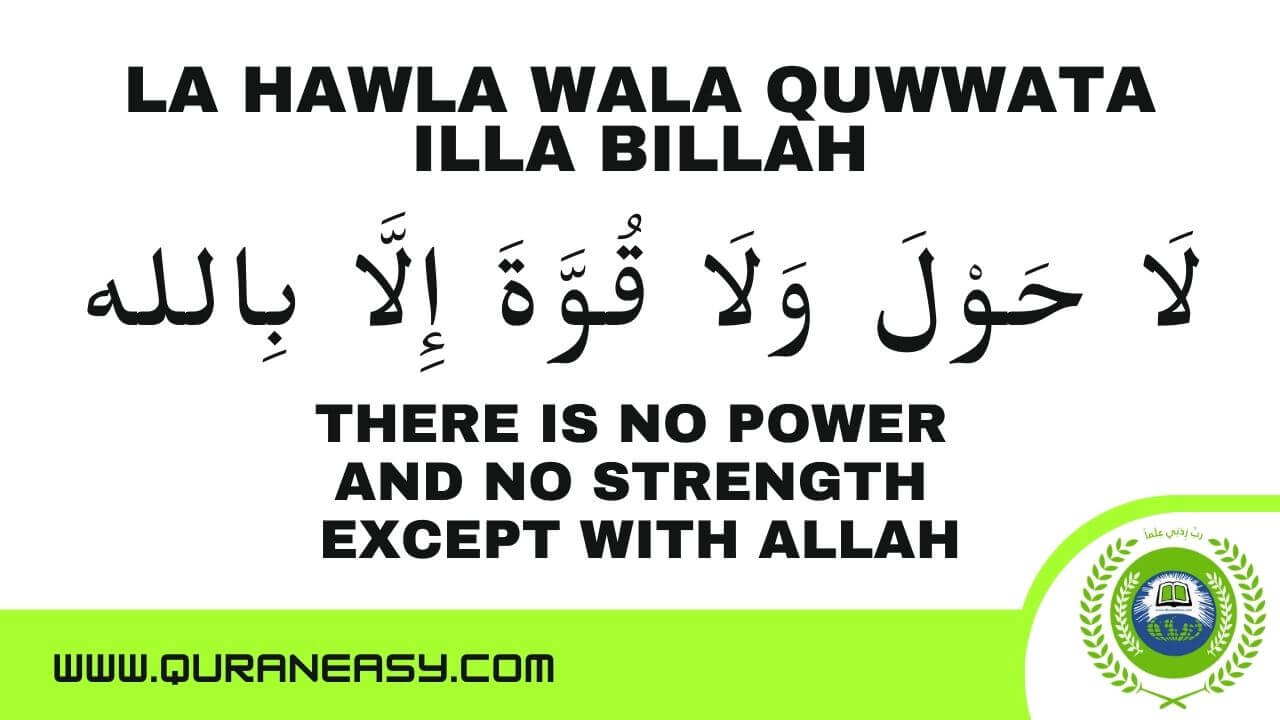


Leave A Comment